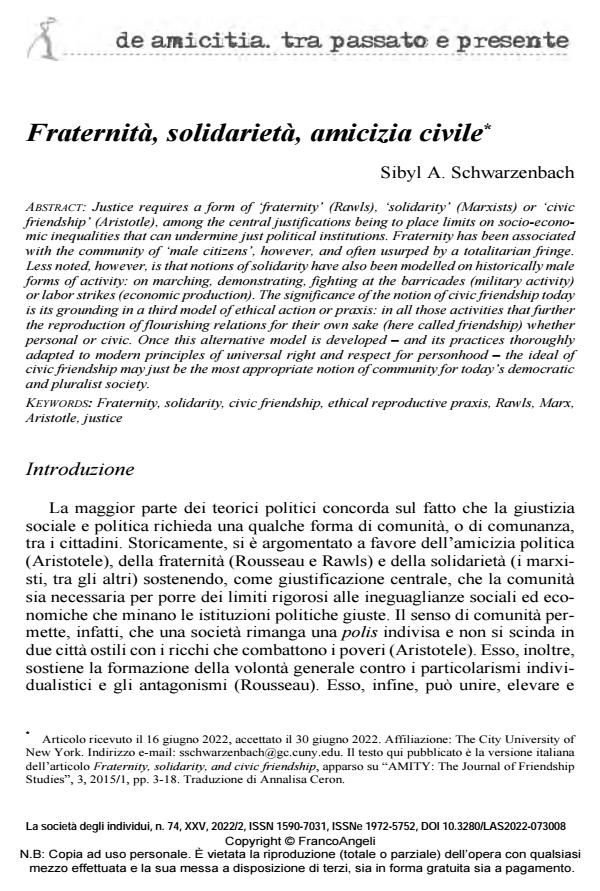Fraternità, solidarietà, amicizia civile
Titolo Rivista SOCIETÀ DEGLI INDIVIDUI (LA)
Autori/Curatori Sibyl A. Schwarzenbach
Anno di pubblicazione 2022 Fascicolo 2022/74
Lingua Italiano Numero pagine 24 P. 110-133 Dimensione file 204 KB
DOI 10.3280/LAS2022-074008
Il DOI è il codice a barre della proprietà intellettuale: per saperne di più
clicca qui
Qui sotto puoi vedere in anteprima la prima pagina di questo articolo.
Se questo articolo ti interessa, lo puoi acquistare (e scaricare in formato pdf) seguendo le facili indicazioni per acquistare il download credit. Acquista Download Credits per scaricare questo Articolo in formato PDF

FrancoAngeli è membro della Publishers International Linking Association, Inc (PILA), associazione indipendente e non profit per facilitare (attraverso i servizi tecnologici implementati da CrossRef.org) l’accesso degli studiosi ai contenuti digitali nelle pubblicazioni professionali e scientifiche.
Justice requires a form of ‘fraternity’ (Rawls), ‘solidarity’ (Marxists) or ‘civic friend¬ship’ (Aristotle), among the central justifications being to place limits on socio-economic inequalities that can undermine just political institutions. Fraternity has been associated with the community of ‘male citizens’, however, and often usurped by a totalitarian fringe. Less noted, however, is that notions of solidarity have also been modelled on historically male forms of activity: on marching, demonstrating, fighting at the barricades (military activity) or labor strikes (economic production). The significance of the notion of civic friendship today is its grounding in a third model of ethical action or praxis: in all those activities that further the reproduction of flourishing relations for their own sake (here called friendship) whether personal or civic. Once this alternative model is developed - and its practices thoroughly adapted to modern principles of universal right and respect for personhood - the ideal of civic friendship may just be the most appropriate notion of community for today’s democratic and pluralist society.
Parole chiave:Fraternity, solidarity, civic friendship, ethical reproductive praxis, Rawls, Marx, Aristotle, justice
Sibyl A. Schwarzenbach, Fraternità, solidarietà, amicizia civile in "SOCIETÀ DEGLI INDIVIDUI (LA)" 74/2022, pp 110-133, DOI: 10.3280/LAS2022-074008